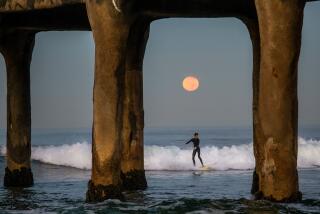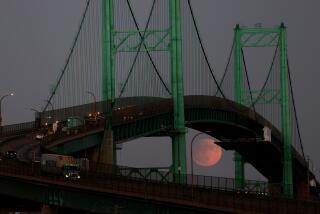Total lunar eclipse Saturday morning: Watch it live, right here
There’s a total lunar eclipse coming in the early hours of Saturday morning, and you can watch it live, right here.
Be forewarned: The eclipse is not at an especially convenient time for sky watchers on the West Coast. The moon begins to move into the dark part of Earth’s shadow at the unpleasant time of 3:15 a.m.
Totality, when the moon is completely engulfed in our planet’s shadow, occurs at the still unpleasant time of 4:58 a.m. and lasts for less than five minutes.
If sleep means nothing to you, you can continue to watch the moon slowly emerge from the shadow of Earth, finally breaking free just as the sun begins to rise.
The astronomy website Slooh.com will stream live images of the eclipse from its network of telescopes around the world. The video broadcast, which you can watch here, begins at 3 a.m. PDT. If you have questions you would like Slooh astronomers to answer, you can pose them on Twitter with the hashtag #BreakfastEclipse.
Only the beginning moments of the eclipse will be visible from the East Coast, because the moon will set before totality is reached. Sky watchers who live west of the Mississippi River will be able to see totality, but only those of us who live in the far western U.S. will be able to watch the entire show before the dawning of day interrupts our view.
This lunar eclipse is the third in a series of four occurring at roughly six-month intervals. The first two occurred on April 15 and Oct. 8 last year. A fourth will take place Sept. 28. Astronomers call this an eclipse tetrad, and it is relatively rare. The last one occurred 10 years ago, and the next won’t take place until 2032, according to Sky & Telescope.
Another thing that makes this eclipse special is that the length of totality is exceptionally brief. That’s because the moon is moving through the narrow upper part of Earth’s circular shadow. If it moved through the center of the shadow, it would last a lot longer.
Happy sky watching!
Science rules! Follow me @DeborahNetburn and “like” Los Angeles Times Science & Health on Facebook.







